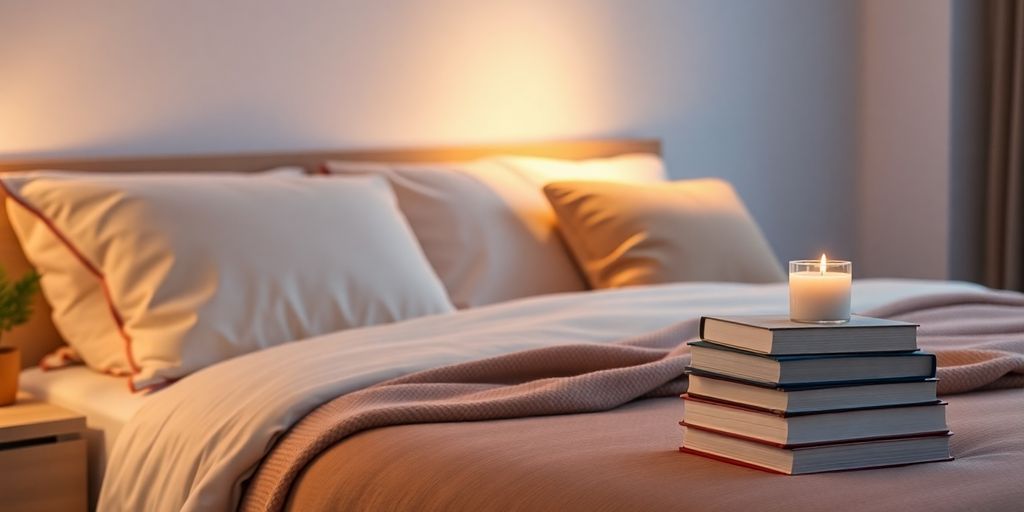Sweet Dreams: The Ultimate Sleep Playlist

Ever tossed and turned all night, wishing for just a few hours of good sleep? You’re not alone. Many folks find that music can be a game-changer when it comes to catching those elusive Z’s. With the right playlist, you might just drift off faster than you think. In this article, we’re diving into how to create the best playlist for sleeping, exploring everything from the science behind sleep music to tips for enhancing your nighttime routine. Whether you’re into classical tunes or modern ambient sounds, there’s something here for everyone looking to improve their sleep quality.
Key Takeaways
- Music can improve sleep quality by affecting sleep patterns and reducing stress.
- Choosing the right tempo and rhythm is important for a sleep-friendly playlist.
- Genres like classical, jazz, and ambient music are often best for relaxation.
- Incorporating nature sounds and white noise can enhance the sleep experience.
- Consistency in listening to sleep music can help establish better sleep habits.
Understanding the Science of Sleep Music
How Music Affects Sleep Patterns
Listening to music before bed can lead to a notable decrease in heart rate and blood pressure, promoting better sleep quality. Studies indicate that this practice may enhance relaxation and improve overall sleep patterns.
The Role of Tempo and Rhythm in Sleep
The tempo and rhythm of music play a crucial role in its sleep-inducing capabilities. Slow tempos, particularly those mimicking the heart’s resting rate, can help ease the mind into a state of calmness. Rhythmic patterns that are consistent and gentle can also aid in lulling the brain into a restful state.
Benefits of Listening to Music Before Bed
Incorporating music into your bedtime routine can offer numerous benefits. Here are a few:
- Reduces stress and anxiety: Music has the power to soothe the mind and reduce stress levels, making it easier to drift into sleep.
- Improves sleep quality: Regularly listening to calming tunes before bed can enhance the overall quality of your sleep.
- Encourages relaxation: Music can create a peaceful environment, setting the stage for a restful night.
Music before sleep isn’t just about the sound; it’s about creating a sanctuary of calmness that allows your body and mind to unwind.
Crafting the Perfect Sleep Playlist

Choosing the Right Genres for Relaxation
When putting together a sleep playlist, picking the right genres is key. Classical music often tops the list for its soothing and calming effects. Genres like ambient and new age music also work wonders, creating a peaceful environment that helps you drift off. Jazz, especially the softer, more mellow tunes, can be another great choice. It’s all about finding what resonates with you and helps you relax.
Incorporating Nature Sounds and White Noise
Adding nature sounds and white noise can elevate your sleep playlist to another level. The gentle rustle of leaves, the sound of rain, or ocean waves can create a tranquil setting that mimics natural environments. White noise, on the other hand, helps to mask disruptive sounds, making it easier to fall asleep and stay asleep. Experiment with different sounds to see what works best for your sleep environment.
Balancing Instrumental and Vocal Tracks
A well-crafted sleep playlist should strike a balance between instrumental and vocal tracks. Instrumentals are often preferred for their simplicity and ability to blend into the background. However, some people find comfort in soft, gentle vocals. The key is to ensure that any lyrics are soothing and not too stimulating, allowing your mind to relax and unwind. Mixing both types can create a diverse playlist that caters to your personal sleep needs.
Creating a sleep playlist is a personal journey. It’s about finding the right mix of sounds and genres that help you relax and drift into a peaceful slumber. Don’t be afraid to experiment and adjust until you find what truly works for you.
Top Tracks for a Restful Night

Classical Pieces for Deep Sleep
When it comes to classical music, some pieces are just perfect for drifting into a peaceful slumber. Chopin’s Nocturnes are a great start. Their gentle melodies and subtle dynamics create a soothing atmosphere ideal for nighttime relaxation. Another classic is Beethoven’s Moonlight Sonata, which, despite its complex emotions, offers a calming experience with its slow tempo. Lastly, consider Debussy’s Clair de Lune—it’s like a musical lullaby that wraps you in tranquility.
Modern Ambient Tracks to Unwind
For those who prefer something more contemporary, modern ambient music offers a vast array of choices. Discover a curated sleep playlist featuring soothing tracks like "Tranquil Owl Sounds," "Furry Slumber Ambient Music," and "Spiritual Rain," designed to enhance relaxation and promote restful sleep. These tracks often incorporate electronic elements with natural sounds, creating an immersive experience that helps in letting go of the day’s stress.
Lullabies for Adults
Lullabies aren’t just for kids anymore. Adult lullabies have gained popularity for their ability to soothe and calm. Look for albums like "Ultimate Lullabies to Help Relaxation" which combine soft piano music with gentle vocals. These tracks are crafted to ease you into sleep, providing a comforting backdrop as you unwind. Another option is "Dreamland Sleep Music," which features calming melodies designed specifically for adults seeking a peaceful night’s rest.
The Psychology Behind Sleep-Inducing Melodies
How Melodies Influence the Mind
Music has a unique way of interacting with our brains, especially when it comes to sleep. Certain melodies can slow down brain activity, helping you relax and drift off. When you listen to music, your brain releases dopamine, which is a feel-good chemical. This can enhance your mood and make it easier to fall asleep. Plus, the rhythm and tempo of a song can sync with your heartbeat, promoting a calming effect.
The Connection Between Music and Dreams
Ever notice how sometimes your dreams seem to echo the music you fell asleep to? That’s because music can influence the content and tone of your dreams. If you’re listening to soothing tunes, you might find your dreams are more positive and serene. This happens because the brain processes music even when you’re asleep, integrating it into your subconscious mind.
Emotional Responses to Sleep Music
Sleep music can evoke a range of emotions, from peace to nostalgia. These emotional responses can help you feel more at ease, making it easier to relax and fall asleep. Here’s a quick list of how different types of music might affect your emotions:
- Classical music: Often brings feelings of calm and tranquility.
- Nature sounds: Can evoke a sense of peace and connection to the earth.
- Lullabies: Might trigger nostalgia and comfort, reminding you of childhood.
Listening to music before bed is not just about the melodies. It’s about creating a safe space where your mind can unwind and prepare for rest.
For those interested in a more tech-savvy approach to enhancing sleep, consider exploring innovative options like the smart mattress from Eight Sleep, which adapts to your body’s needs for a better night’s rest.
Tips for Enhancing Your Sleep Experience
Creating a Relaxing Bedtime Routine
Establishing a calming pre-sleep routine can work wonders for your nightly rest. Start by dimming the lights and turning off screens at least an hour before bed. Instead, engage in activities that help you unwind, like reading a book or taking a warm bath. Consider incorporating gentle stretches or meditation to further ease into relaxation.
- Dim the lights
- Avoid screens
- Read or take a bath
Using Technology to Improve Sleep Quality
While screens can be a distraction, technology can also be your ally in achieving better sleep. Smart sleep apps can help track your sleep patterns and suggest improvements. Devices like white noise machines or smart speakers can play soothing sounds or sleep playlists to lull you into slumber. Just make sure to set them to turn off automatically, so they don’t disturb your sleep cycle.
The Importance of Consistency in Sleep Habits
Consistency is key when it comes to sleep. Try to go to bed and wake up at the same time every day, even on weekends. This helps regulate your body’s internal clock, making it easier to fall asleep and wake up naturally. If you struggle with this, consider keeping a sleep diary to track your habits and identify patterns that might be affecting your rest.
Sticking to a consistent sleep schedule can significantly improve your overall sleep quality. It might be tough at first, but your body will thank you!
For more tips on improving your sleep quality, check out our effective tips to enhance sleep quality and overall wellbeing.
Exploring Different Sleep Music Albums
Review of Popular Sleep Music Albums
Finding the right sleep music album can be a game-changer for your nighttime routine. "Help Me Sleep (The Ultimate Sleep Solution Playlist)" by Sleep Help Ensemble is one standout. Released in 2015, this album offers over two hours of calming tracks designed to ease you into slumber. It’s part of a larger collection that includes titles like "Insomnia Cure" and "2021 Deep Sleep Music," all targeting sleep improvement through soothing melodies.
Another popular choice is "Keep Calm with New Age Sounds," focusing on pure soundscapes and nature sounds, perfect for those who prefer a more meditative approach before bed. This album integrates elements of yoga and wellness, providing a holistic experience.
Comparing Various Artists and Styles
When it comes to sleep music, variety is the spice of life. Sleep Help Ensemble isn’t the only artist crafting tunes for dreamland. Albums like "Binaural Beats for Sleep" and "Tranquil Oasis" showcase different approaches, from brainwave entrainment to serene spa-like atmospheres. Here’s a quick comparison:
- Sleep Help Ensemble: Known for instrumental and ambient tracks.
- Meditation Relax Club: Combines meditation music with deep sleep tones.
- Dream Music Academy: Offers calming melodies and lullabies.
Each artist brings something unique to the table, whether it’s through the use of isochronic tones or the incorporation of natural sounds.
Finding Hidden Gems in Sleep Music
Beyond the popular albums, there are hidden gems waiting to be discovered. "Ultimate Lullabies to Help Relaxation" is one such find, blending piano music with gentle melodies to create a relaxing ambiance. "30 Ways to Fall Asleep" offers a diverse mix of sleep music and meditation tracks, promising a peaceful transition to sleep.
Sometimes, the best sleep music isn’t the most well-known. Exploring lesser-known albums might just lead you to the perfect soundtrack for your dreams.
In conclusion, whether you’re into ambient sounds, nature-inspired tunes, or classical lullabies, there’s a sleep music album out there for everyone. Take the time to explore different artists and styles, and you might just find the perfect melody to drift off to each night.
The Future of Sleep Playlists
Innovations in Sleep Music Technology
The world of sleep music is evolving fast. New tech is transforming how we experience these playlists. From smart speakers that adapt the music based on your sleep cycle to apps that use AI to craft the perfect mix, there’s a lot happening. Imagine a playlist that changes tempo as you drift into deeper sleep stages. That’s the future we’re heading towards. And it’s not just about the music. Devices now can track your sleep patterns and adjust the sound environment to help you sleep better.
Trends in Sleep Music Consumption
Sleep music is more popular than ever. People are tuning in not just for sleep but for relaxation and focus too. With platforms like Spotify and Apple Music, it’s easier than ever to find a playlist that suits your mood. There’s a growing interest in curated Sleep Token playlists that blend meditation and emotional connection. It’s not just about putting on a random track anymore; it’s about finding the right vibe.
The Growing Popularity of Sleep Playlists
Sleep playlists are becoming mainstream. More folks are discovering the benefits of winding down with music. Whether it’s classical, ambient, or even nature sounds, there’s something for everyone. This surge in popularity is also driving artists to create more sleep-focused albums. It’s a whole new genre that’s emerging, and it’s here to stay.
With the rise of personalized sleep solutions, the future looks bright for those seeking a better night’s rest through music.
Wrapping Up Your Sleep Journey
So, there you have it, folks. Crafting the perfect sleep playlist isn’t just about picking any slow song. It’s about finding those tunes that make you feel at ease, like a cozy blanket on a chilly night. Music can be a powerful tool to help you drift off, and with the right playlist, you might just find yourself catching those Z’s a little easier. Whether it’s the gentle strum of a guitar or the soft hum of a piano, let the music guide you to dreamland. Sweet dreams and happy snoozing!
Frequently Asked Questions
Can listening to music really help me fall asleep?
Yes, listening to calming music can help you relax and fall asleep faster by reducing stress and anxiety.
What type of music is best for sleeping?
Soft, slow music like classical or ambient tunes are often best for sleep because they have a calming effect.
How loud should the music be when I’m trying to sleep?
Keep the volume low, just enough to hear it. Loud music can be distracting and might keep you awake.
Are there any risks to listening to music while sleeping?
Generally, it’s safe. However, using headphones can be uncomfortable or pose a risk if the volume is too high.
How long before bed should I start listening to sleep music?
Try starting your music about 30 minutes before you plan to sleep to give yourself time to unwind.
Can nature sounds be more effective than music for sleep?
Nature sounds like rain or ocean waves can be very soothing and work well for some people as a sleep aid.








Responses